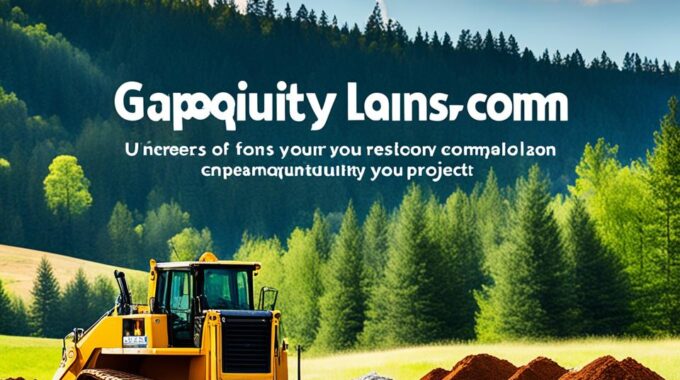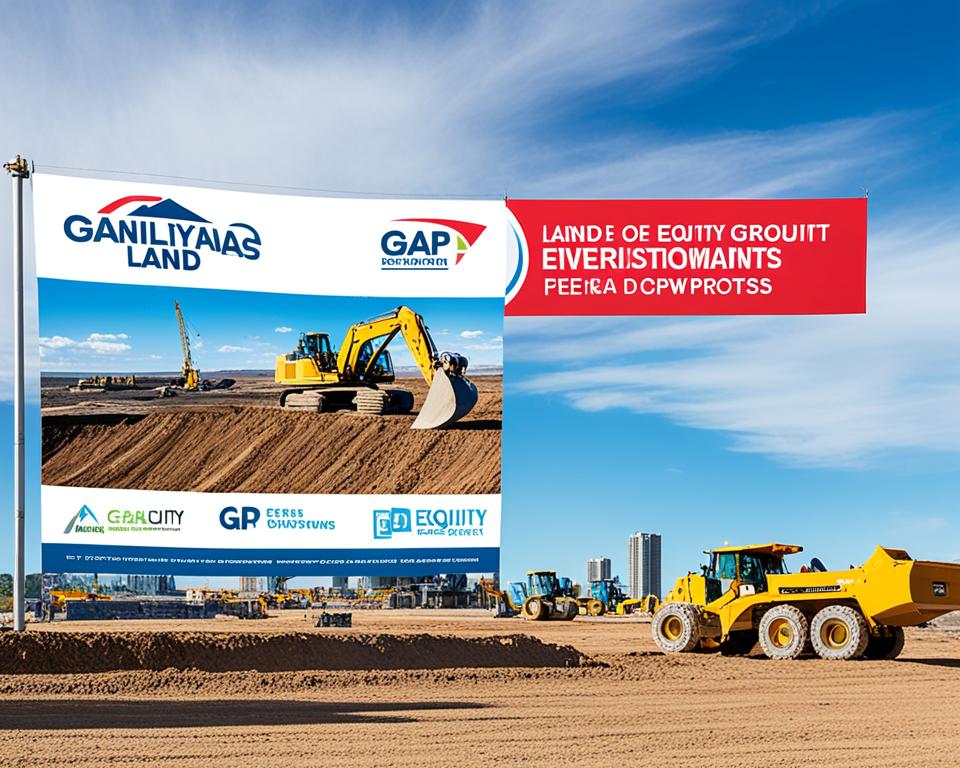Unlock the advantages-of-a-home-equity-loan-in-costa-rica. We connect borrowers with private investors, offering lower fees and flexible loan terms.

Fund Your Land Development Project | Easy Financing Options With Gapequityloans.com
Land development projects are key to improving our communities and boosting the economy. They turn empty lands into areas for homes, businesses, or factories. Yet, getting enough money for these projects is a big hurdle for developers. Banks don’t always offer easy loans, especially for big projects.
Key Takeaways
- Innovative financing solutions are available to fund land development projects, beyond traditional bank loans.
- Private money and angel investors, seller financing, equity partnerships, and government housing programs offer alternative funding sources.
- Gap Equity Loans provide quick access to funds, flexible terms, and loans based on property value, making them a viable option for land development financing.
- Equity loan companies in Costa Rica, like GAP Equity Loans, deliver tailored financing solutions to meet diverse project needs.
- GAP Equity Loans stands out with competitive rates, expedited application processes, and a focus on customer satisfaction.
The Challenges of Funding Land Development Projects
Land development projects are key in shaping communities and boosting economy. They change raw lands into ready-to-use spaces for homes, shops, or factories. Yet, getting enough money is a big problem for developers. It’s hard to get loans from banks, especially for large-scale developments.
Traditional Financing Methods: Limitations and Restrictions
Bank loans are a common way to get money, but they have many rules. Lenders might not want to fund large-scale development projects because of risks and market changes. So, getting the needed money can be tough for developers.
The Need for Innovative Funding Solutions
Dealing with the limits of traditional financing means finding creative funding. This can give more flexible financial options and new ways to get money. By not relying solely on banks, developers can find fresh chances for their projects.

Fund Your Land Development Project
We will look at clever ways to fund your land project. No matter if you’re new or experienced, these ideas help start your next big project.
Private Money and Angel Investors
Using private lenders and angel investors can help get your project going fast. They’re less strict than banks, making it easier and quicker to get the cash you need.
Seller Financing
Talking with the owner for financing can lower your starting costs. You might get a good deal like a smaller down payment or longer to pay back.
Equity Partnerships
Partnering with investors can bring in the needed funds. By working together, you all share in the project’s success and help each other out.
Government Housing Programs
Look into local government programs like in Costa Rica for extra support. You might find grants, loans, or help for making affordable housing.
Gap Equity Loans
Gap Equity Loans can fill the financial void for your project. They use the land’s value to offer support and they’re easier and faster to get than traditional loans. GAP Equity Loans have good rates and getting one is straightforward, perfect for developers.

The Benefits of Gap Equity Loans for Land Development
In Costa Rica, Gap Equity Loans stand out for real estate developers. They offer quick funding, flexible terms, and higher loan amounts. The lenders know a lot about financing real estate. This makes getting funding for projects easier and more informed.
Quick Access to Funds
Gap Equity Loans are quick to fund. You can get money in 7-10 days, much faster than from a bank. This quickness is key for projects needing fast capital like land development.
Flexible Terms
These loans come with terms that fit your project’s needs. You can get a loan for 6 months to 3 years, sometimes 5 years. This helps match the financing to your project’s timing and cash flow.
Based on Property Value
Traditional loans look at credit and income, but not Gap Equity Loans. They look mostly at the land’s value. This is good news for developers with irregular incomes. The loan amount is based more on the project’s potential earnings.
Potential for Larger Loan Amounts
Developers in Costa Rica get bigger loans with Gap Equity than with a bank. Loans can go from $50,000 up to the millions. This helps fund large projects more easily.
Expertise in Real Estate Financing
The lenders know a lot about financing land projects. They understand the unique needs of the real estate world. This knowledge helps in finding the right finance for each project.
Gap Equity Loans are a great help for Costa Rica developers. They offer a way to get the funding needed for big projects. With these loans, it’s easier to turn raw land into thriving places.

Creative Financing Strategies for Your Land Development Project
Traditional ways of funding land in Costa Rica can be tough. Alternatives exist to get over these big hurdles. Here, we’ll look at four unique ways to finance your next project.
Understanding the Role of Private Money Lenders
Private money lenders offer a different kind of financing. They’re more flexible and can get you funds quickly. This means you don’t have to deal with the strict rules and long waits of traditional loans.
Navigating Seller Financing Opportunities
Working with a land’s current owner for financing can be very beneficial. This form of seller financing means getting better terms or more time to pay back. It’s ideal for deals with sellers who are open to new financing ideas.
Forming Strategic Equity Partnerships
Teaming up with equity partners spreads the risks and resources of your project. This can be through joint ventures or real estate groups. Each type offers different pros and cons.
Leveraging Government Housing Programs
The Costa Rican government, like many others, supports building homes through various programs. Using these can help with funding and lower the cost of your project.
By looking into these innovative finance options, you can find new ways to make your project happen. These methods offer the funds, flexibility, and partnerships needed to succeed in land development.

Conclusion
In Costa Rica, there are many ways to finance land projects in creative ways. We’ve looked into getting Gap Equity Loans and support from private investors and seller financing. Also, forming partnerships and using government programs are valuable options.
All these choices have special benefits. Gap Equity Loans are quick, flexible, and suited for those with weak credit. But, government programs give lower rates and good terms, yet it may take time to qualify.
Call To See If You Qualify For a Loan Today
As you look into funding your project, feel free to contact our team for advice. We can see if you’re eligible for a Gap Equity Loan or help explore other options. Our team is ready to assist you in getting your project funded.
FAQ
What are the challenges of funding land development projects?
Developers often find getting enough money for their projects tough. Bank loans, a usual way to get funds, can be hard to get. This is especially true for big projects.
What are some creative ways to fund a land development project?
Ways to get funding for your project include dealing with private investors, using seller financing, and forming partnerships. You can also try for government programs or get Gap Equity Loans.
What are the benefits of Gap Equity Loans for land development?
Gap Equity Loans have many perks. They give you money fast, have flexible rules, and are based on your property’s value. You’ll also work with experts in real estate finance.
How can private money lenders help with land development financing?
Private investors offer money with more freedom than banks do. They are a good choice for developers needing creative financing.
What should I consider when exploring seller financing for land development?
Using seller financing is a good way to get your land project funded. You need to be smart about the deal you make with the seller. This ensures both sides benefit.
Source Links
- https://www.gapequityloans.com/en/fund-your-land-development-project/
- https://www.gapequityloans.com/en/real-estate-development-loans-costa-rica/
- https://www.gapequityloans.com/en/costa-rica-real-estate-development-loans-guide-with-gapequityloans-com/
- https://www.investopedia.com/ask/answers/100214/what-are-some-challenges-real-estate-development.asp
- https://landmarkestateslondon.medium.com/the-challenges-faced-by-real-estate-developers-and-how-they-overcome-them-67d9594d7ae9
- https://www.linkedin.com/pulse/challenges-project-owners-borrowers-secure-financing-murat-wahab-mba
- https://www.gapequityloans.com/en/commercial-loans/
- https://www.gapequityloans.com/en/costa-rica-home-equity-loans/
- https://www.alterfinancegroup.com/en/blog/financing/finance-project-real-estate-promotion/
- https://gowercrowd.com/real-estate-syndication/finance-development
- https://www.gapequityloans.com/en/construction-loans/
- https://www.gapequityloans.com/en/equity-loans-faq/
- https://gapinvestments.com/en/real-estate-development-loans-in-costa-rica/
- https://prowess.org.uk/how-to-secure-financing-for-your-property-development-project/
- https://terrydalecapital.com/learn/gap-equity
- https://marsh-partners.com/blog/development-financing-how-to-finance-your-next-real-estate-development-venture
- https://fastercapital.com/topics/financing-your-land-development-project.html
- https://www.linkedin.com/advice/0/how-do-you-analyze-land-development-project
- https://metroprivatelending.com/land-development-loans-fund-your-project/
Article by Glenn Tellier (Founder of CRIE and Grupo Gap)



